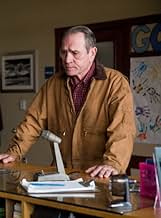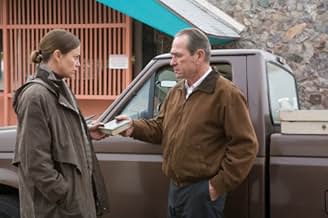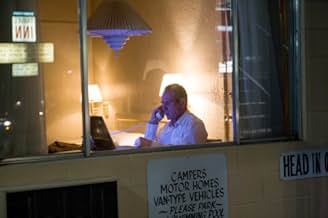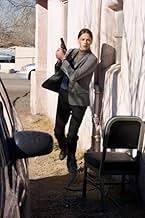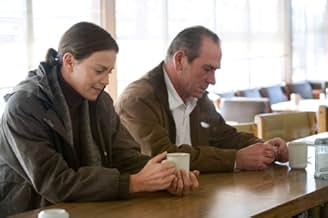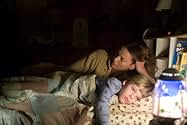A retired military investigator works with a police detective to uncover the truth behind his son's disappearance following his return from a tour of duty in Iraq.A retired military investigator works with a police detective to uncover the truth behind his son's disappearance following his return from a tour of duty in Iraq.A retired military investigator works with a police detective to uncover the truth behind his son's disappearance following his return from a tour of duty in Iraq.
- Nominated for 1 Oscar
- 3 wins & 21 nominations total
Roman Arabia
- Private Robert Ortiez
- (as Victor Wolf)
Greg Serano
- Detective Manny Nunez
- (as Greg Serrano)
Featured reviews
This movie is just about perfect. I love how it starts as a genre movie and then transcends into something deeper and soul-searching. Some people just don't like Paul Haggis, but I'm not one of them. I think he's very smart here; he has no political point of view, he handles Charlize Theron perfectly, and the movie forces everybody to think about the troops in a way that isn't simply political rhetoric. I love that Tommy Lee Jones feels the way so many dads do. He's never been better. Watching the police work happen is interesting on it's own, but I like that Charlize Theron is just out to do the job correctly and just shrugs off the chauvinism coming at her from her department. The movie could've gone somewhere with that, but instead just quietly lets us in on it and moves on.
There have been many very good movies the last few years about Iraq-related themes, but I don't think there is a film that captures the feeling of the national mood as good as this one. It's drained of melodrama and just sort of moves forward on really good performances of the whole cast, who all act according to their natures instead of because of stupid plot requirements.
There have been many very good movies the last few years about Iraq-related themes, but I don't think there is a film that captures the feeling of the national mood as good as this one. It's drained of melodrama and just sort of moves forward on really good performances of the whole cast, who all act according to their natures instead of because of stupid plot requirements.
I just saw this film and consider it to be one of the best anti-war films I've seen in quite a long time. And that makes me wonder at what the various critics are thinking. Roger Ebert gets it right, but some film critics are far too dismissive of a very serious, important film. James Berardinelli, in particular, seems curiously _angry_ that this film depicts the moral degradation of war in a frank and honest fashion.
Berardinelli is basically wrong in every single thing he says about the film. Since this film is not a "politcal message" film, it has no requirement to "show both sides equally". It is a story about a group of soldiers basically driven beyond the area of traditionally human behavior. Berardinelli thinks that it's "obvious" that war changes the way people feel about their country.
I sense a person utterly detached from history when I read that. A recent study concluded that the English were, as a group, fairly happy during WWII, even when their nation was under attack. Why was that? Because they believed in what they were doing. The notion that war _necessarily_ results in moral breakdown is, while hardly novel, also not true. That is part of what is important about "Elah". Jones' character is a veteran of the Vietnam war, and is hardly a delicate flower when it comes to the matters of war and its effect on the psyche. And yet even he is floored at what the Iraq war has done to the soldiers.
It is easy for a film critic to simply reject what is essentially reporting on the state of the military today. That Berardinelli does so with such vitriol makes me guess that he is injecting his own bias into the review.
Berardinelli is basically wrong in every single thing he says about the film. Since this film is not a "politcal message" film, it has no requirement to "show both sides equally". It is a story about a group of soldiers basically driven beyond the area of traditionally human behavior. Berardinelli thinks that it's "obvious" that war changes the way people feel about their country.
I sense a person utterly detached from history when I read that. A recent study concluded that the English were, as a group, fairly happy during WWII, even when their nation was under attack. Why was that? Because they believed in what they were doing. The notion that war _necessarily_ results in moral breakdown is, while hardly novel, also not true. That is part of what is important about "Elah". Jones' character is a veteran of the Vietnam war, and is hardly a delicate flower when it comes to the matters of war and its effect on the psyche. And yet even he is floored at what the Iraq war has done to the soldiers.
It is easy for a film critic to simply reject what is essentially reporting on the state of the military today. That Berardinelli does so with such vitriol makes me guess that he is injecting his own bias into the review.
This movie deals with the serious business of war and what it does to people.
It also deals with the anguish of parents, and how they try to deal with loss. When all is gone and there seems no point carrying on.
As well as this there is the military and how it deals with its image and the fragility of the men it must use.
The ex military father tries to find the truth behind his sons death. Despite him feeling he could do a better job than the police. Even he is caught out by the truth.
The movie is slow, and serious, and even disturbing at times. However, it always keeps you interested, and is a good watch; if you are in the right mood for it.
It also deals with the anguish of parents, and how they try to deal with loss. When all is gone and there seems no point carrying on.
As well as this there is the military and how it deals with its image and the fragility of the men it must use.
The ex military father tries to find the truth behind his sons death. Despite him feeling he could do a better job than the police. Even he is caught out by the truth.
The movie is slow, and serious, and even disturbing at times. However, it always keeps you interested, and is a good watch; if you are in the right mood for it.
Only Roger Ebert and the reviewer for Rolling Stone seem to see the truth here: this film is slow and elegiac because it deals with heavy matters, but it is never boring, not if you understand the situation and the depth of feelings being explored. It's as if reviewers don't get it because they didn't really feel what the film is saying. Saying that there have been dozens of films about how war ruins men so it's a cliché, and that this one is too dreary and slow means that a person has stopped feeling for what is really hurtful, is even in denial. And that's the theme of this film: what happens when we lose touch with what's painful and don't care any more. The film is restrained but powerful, which is why it has such a strong effect.
Jones is wonderfully grim, with a face like a road map, as he explores what happened to his son. Charlize Theron is beautiful even though she is playing a woman who is forced to act as non-sexy as possible to get on in her job in a male police force. Susan Sarandon is not, as some critic said, "underused"; she gives a performance that is all the more powerful because it is restrained. This movie should be a must see for all who believe that the Iraq war should continue until there is an honorable time for America to leave. That time is already passed.
Jones is wonderfully grim, with a face like a road map, as he explores what happened to his son. Charlize Theron is beautiful even though she is playing a woman who is forced to act as non-sexy as possible to get on in her job in a male police force. Susan Sarandon is not, as some critic said, "underused"; she gives a performance that is all the more powerful because it is restrained. This movie should be a must see for all who believe that the Iraq war should continue until there is an honorable time for America to leave. That time is already passed.
Released in 2007 and directed & written by Paul Haggis, "In the Valley of Elah" is a crime drama/mystery inspired by the real-life case of Richard T. Davis. The story revolves around an elderly Tennessee couple (Tommy Lee Jones & Susan Sarandon) who get word that their son has gone missing from his base in New Mexico shortly after his return from Iraq. A retired military investigator, Hank Deerfield (Jones) goes to the base to find out the awful truth. Charlize Theron plays the civilian detective near the base who tries to help Hank while Jason Patric plays the Army counterpart. Josh Brolin is on hand as the town police chief.
This is a slow-burn mystery highlighted by great acting by the principles, especially Jones, and a thoroughly realistic story, which isn't surprising seeing as how it's based on true events. Speaking of which, I was surprised to find out that the basic details of the story are all accurate. The actual events took place in the Fort Benning area of Georgia rather than the fictitious Fort Rudd, NM.
The movie's not anti-Iraq War, but rather anti-PTSD; it merely reveals the awful truth about war in general: When we send our young men off to far-off lands where brutal warfare is normal they can bring that desensitized mentality back with them where the barbaric behavior that might be acceptable in war is anything but normal or conducive to a successful life, to say the least. Add the idiocy of alcohol abuse to the mix of PTSD and the results almost certainly WON'T be good.
The title refers to the valley where David, as a teen, fought and defeated the utterly intimidating Goliath from 1 Samuel 17.
ADDITIONAL ACTORS: James Franco, Wes Chatham, Jake McLaughlin, Mehcad Brooks and Roman Arabia play soldiers who knew Deerfield's son while Frances Fisher has a curious cameo (you'll know what I mean).
The film runs 121 minutes and was shot in Whiteville, Tennessee, and Albuquerque, New Mexico, with Morocco substituting for Iraq.
GRADE: B
This is a slow-burn mystery highlighted by great acting by the principles, especially Jones, and a thoroughly realistic story, which isn't surprising seeing as how it's based on true events. Speaking of which, I was surprised to find out that the basic details of the story are all accurate. The actual events took place in the Fort Benning area of Georgia rather than the fictitious Fort Rudd, NM.
The movie's not anti-Iraq War, but rather anti-PTSD; it merely reveals the awful truth about war in general: When we send our young men off to far-off lands where brutal warfare is normal they can bring that desensitized mentality back with them where the barbaric behavior that might be acceptable in war is anything but normal or conducive to a successful life, to say the least. Add the idiocy of alcohol abuse to the mix of PTSD and the results almost certainly WON'T be good.
The title refers to the valley where David, as a teen, fought and defeated the utterly intimidating Goliath from 1 Samuel 17.
ADDITIONAL ACTORS: James Franco, Wes Chatham, Jake McLaughlin, Mehcad Brooks and Roman Arabia play soldiers who knew Deerfield's son while Frances Fisher has a curious cameo (you'll know what I mean).
The film runs 121 minutes and was shot in Whiteville, Tennessee, and Albuquerque, New Mexico, with Morocco substituting for Iraq.
GRADE: B
Did you know
- TriviaThis film was originally a potential starring vehicle for Clint Eastwood, who directed Paul Haggis' screenplay for Million Dollar Baby (2004). Eastwood turned it down, despite liking the script very much, and recommended his friend Tommy Lee Jones for the role of Hank Deerfield.
- GoofsThe opening subtitle says that the Deerfields live in "Munro, Tennessee", but the address on the side of Hank's truck says "Munroe, Tennessee".
- Quotes
Chief Buchwald: But didn't you just say that you would do whatever you were told?
Det. Emily Sanders: Yeah, I sometimes exaggerate for effect.
- SoundtracksShu44le
Written by Robin Davey and Jesse Davey
Performed by The Davey Brothers
Courtesy of The Davey Brothers
Details
- Release date
- Country of origin
- Official sites
- Language
- Also known as
- Death and Dishonor
- Filming locations
- Production companies
- See more company credits at IMDbPro
Box office
- Budget
- $22,000,000 (estimated)
- Gross US & Canada
- $6,777,741
- Opening weekend US & Canada
- $133,557
- Sep 16, 2007
- Gross worldwide
- $29,541,790
- Runtime
- 2h 1m(121 min)
- Color
- Sound mix
- Aspect ratio
- 2.35 : 1
Contribute to this page
Suggest an edit or add missing content







